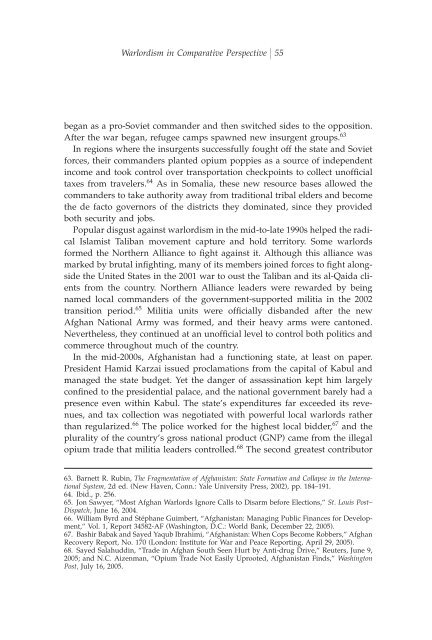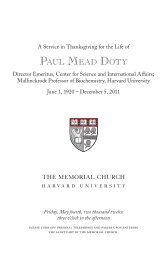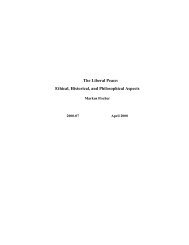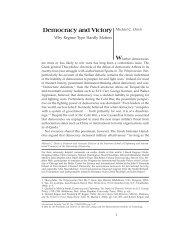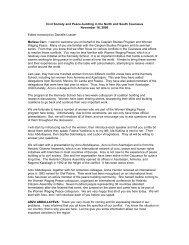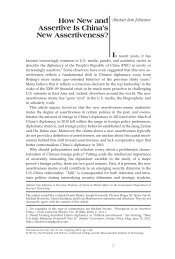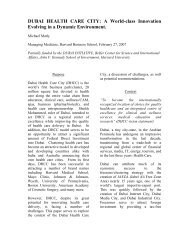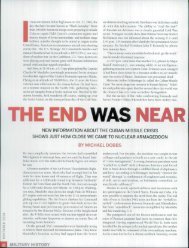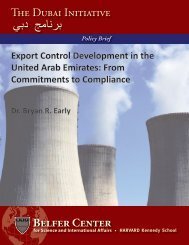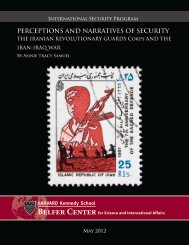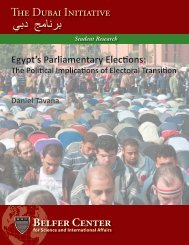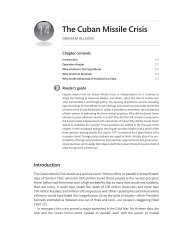Warlordism in Comparative Perspective - MIT Press Journals
Warlordism in Comparative Perspective - MIT Press Journals
Warlordism in Comparative Perspective - MIT Press Journals
You also want an ePaper? Increase the reach of your titles
YUMPU automatically turns print PDFs into web optimized ePapers that Google loves.
<strong>Warlordism</strong> <strong>in</strong> <strong>Comparative</strong> <strong>Perspective</strong> 55<br />
began as a pro-Soviet commander and then switched sides to the opposition.<br />
After the war began, refugee camps spawned new <strong>in</strong>surgent groups. 63<br />
In regions where the <strong>in</strong>surgents successfully fought off the state and Soviet<br />
forces, their commanders planted opium poppies as a source of <strong>in</strong>dependent<br />
<strong>in</strong>come and took control over transportation checkpo<strong>in</strong>ts to collect unofªcial<br />
taxes from travelers. 64 As <strong>in</strong> Somalia, these new resource bases allowed the<br />
commanders to take authority away from traditional tribal elders and become<br />
the de facto governors of the districts they dom<strong>in</strong>ated, s<strong>in</strong>ce they provided<br />
both security and jobs.<br />
Popular disgust aga<strong>in</strong>st warlordism <strong>in</strong> the mid-to-late 1990s helped the radical<br />
Islamist Taliban movement capture and hold territory. Some warlords<br />
formed the Northern Alliance to ªght aga<strong>in</strong>st it. Although this alliance was<br />
marked by brutal <strong>in</strong>ªght<strong>in</strong>g, many of its members jo<strong>in</strong>ed forces to ªght alongside<br />
the United States <strong>in</strong> the 2001 war to oust the Taliban and its al-Qaida clients<br />
from the country. Northern Alliance leaders were rewarded by be<strong>in</strong>g<br />
named local commanders of the government-supported militia <strong>in</strong> the 2002<br />
transition period. 65 Militia units were ofªcially disbanded after the new<br />
Afghan National Army was formed, and their heavy arms were cantoned.<br />
Nevertheless, they cont<strong>in</strong>ued at an unofªcial level to control both politics and<br />
commerce throughout much of the country.<br />
In the mid-2000s, Afghanistan had a function<strong>in</strong>g state, at least on paper.<br />
President Hamid Karzai issued proclamations from the capital of Kabul and<br />
managed the state budget. Yet the danger of assass<strong>in</strong>ation kept him largely<br />
conªned to the presidential palace, and the national government barely had a<br />
presence even with<strong>in</strong> Kabul. The state’s expenditures far exceeded its revenues,<br />
and tax collection was negotiated with powerful local warlords rather<br />
than regularized. 66 The police worked for the highest local bidder, 67 and the<br />
plurality of the country’s gross national product (GNP) came from the illegal<br />
opium trade that militia leaders controlled. 68 The second greatest contributor<br />
63. Barnett R. Rub<strong>in</strong>, The Fragmentation of Afghanistan: State Formation and Collapse <strong>in</strong> the International<br />
System, 2d ed. (New Haven, Conn.: Yale University <strong>Press</strong>, 2002), pp. 184–191.<br />
64. Ibid., p. 256.<br />
65. Jon Sawyer, “Most Afghan Warlords Ignore Calls to Disarm before Elections,” St. Louis Post–<br />
Dispatch, June 16, 2004.<br />
66. William Byrd and Stéphane Guimbert, “Afghanistan: Manag<strong>in</strong>g Public F<strong>in</strong>ances for Development,”<br />
Vol. 1, Report 34582-AF (Wash<strong>in</strong>gton, D.C.: World Bank, December 22, 2005).<br />
67. Bashir Babak and Sayed Yaqub Ibrahimi, “Afghanistan: When Cops Become Robbers,” Afghan<br />
Recovery Report, No. 170 (London: Institute for War and Peace Report<strong>in</strong>g, April 29, 2005).<br />
68. Sayed Salahudd<strong>in</strong>, “Trade <strong>in</strong> Afghan South Seen Hurt by Anti-drug Drive,” Reuters, June 9,<br />
2005; and N.C. Aizenman, “Opium Trade Not Easily Uprooted, Afghanistan F<strong>in</strong>ds,” Wash<strong>in</strong>gton<br />
Post, July 16, 2005.


